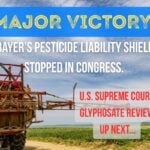The Defender, Children’s Health Defense | Charles Eisenstein | July 21, 2025
Republican leaders will vote tomorrow on legislation that would strip American citizens injured by pesticides of their right to sue chemical companies. Meanwhile, Democratic Sen. Cory Booker has introduced a bill that would give Americans the right to hold pesticide makers accountable for the harm they cause. It’s time for MAHA to build a nonpartisan alliance for a healthy America.
On July 17, Sen. Cory Booker (D-N.J.) introduced a provocative piece of legislation, the Pesticide Injury Accountability Act, designed to guarantee Americans the right to sue pesticide manufacturers for proven harms caused by their products.
The bill is a direct response to recent efforts at the federal and state levels to grant liability immunity to global pesticide corporations like Monsanto (now owned by Germany’s Bayer) and Syngenta (owned by ChemChina).
Booker’s legislation has been endorsed by 18 organizations, including farmers’ groups and, notably, many of the largest grassroots Make America Healthy Again (MAHA) organizations, including Moms Across America, Global Wellness Forum, and Children’s Health Defense (CHD). These aren’t just the usual environmental NGOs, but represent the very heart of the movement widely credited with an instrumental role in President Donald Trump’s 2024 election victory.
So what are they doing supporting a Democrat-sponsored piece of legislation? The answer is simple. Pesticides are an issue of central concern to the MAHA movement.
MAHA isn’t just about medical freedom, vaccine safety, and ultraprocessed foods. It is active across many health-related issues, including plastic pollution; toxic chemicals in air, soil, and water; regeneration of healthy soil; restoration and protection of family farms and local food production; wildlife conservation; electromagnetic pollution; and, yes, pesticides.
There is virtually no MAHA supporter who favors pesticide liability shields, which imitate the much-despised vaccine liability shield enacted in 1986 at the behest of Big Pharma. The pesticide liability shield is even worse, lacking even the inadequate reporting system and compensation court that exists for vaccines.
Despite clear scientific evidence linking pesticides like glyphosate and paraquat to cancers, birth defects, Parkinson’s disease, and infertility, the U.S. permits 85 pesticides banned in countries across Europe, China, and Brazil. Shockingly, glyphosate is found in 80% of Americans tested, and 87% of children, according to CDC data.
Few Republicans seem to understand how important this issue is to the MAHA base. Republican legislatures in Georgia and North Dakota have passed liability shields, and many more are trying.
House Republicans just inserted liability shield language into this year’s Interior Appropriations bill and have announced plans to do so in the next Farm Bill. This is a slap in the face to the MAHA community.
Senator Booker is actively seeking co-sponsors among MAHA-aligned Republicans willing to work across the aisle toward common goals. In fact, the Pesticide Injury Accountability Act rests on principles Republicans traditionally support. If a business can’t survive without legal immunity, it shouldn’t exist in a free-market economy. Liability shields remove any financial incentive to develop safe products or study their risks.
Monsanto has paid billions in settlements related to glyphosate-linked cancers, and Syngenta recently agreed to a $187.5 million settlement over paraquat-related Parkinson’s disease claims. Shielding these (foreign-owned) corporations shifts the costs onto consumers, farmers, and the healthcare system.
U.S. Health Secretary Kennedy has made huge strides toward realizing MAHA priorities within the U.S. Department of Health and Human Services. However, the same cannot be said for the U.S. Department of Agriculture (USDA) or the U.S. Environmental Protection Agency (EPA), where recent appointments of food and chemical-industry lobbyists to policy positions starkly contradict the MAHA mission.
In March, the administration killed USDA grants that let schools and food banks buy produce from local farmers. This gut-punch to family farmers also pushes kids toward the ultra-processed food Kennedy is trying to control.
Meanwhile, EPA chief Lee Zeldin moved to loosen restrictions on PFAS (“forever chemicals”) and to narrow Clean Water Act protections, opening millions of acres to contamination. Such actions risk derailing the very agenda that galvanized MAHA supporters in the first place.
At this moment, when old alignments are wavering, these incongruities pose both political parties, and MAHA as well, with some defining choices.
Republicans must decide whether they will adhere to narrow corporate positions that infuriate their increasingly populist base. There is no constituency for pesticide poisoning, microplastics, or toxic waste.
Republican congresspeople have a chance in Tuesday’s Ag Committee meeting and Appropriations Markup meeting to change course on pesticides and win back the support of an increasingly unhappy MAHA constituency.
For their part, Democrats should take a good hard look at how they alienated a vast swath of supporters by siding with pharmaceutical mega-corporations against whistleblowers and grassroots moms. Nearly everyone in the MAHA movement voted for Barack Obama in 2012. If they were wise, the Democrats would move beyond knee-jerk antipathy toward MAHA and Secretary Kennedy, and recall their own populist roots.
As for MAHA organizations, they must decide whether they are to become appendages of the Republican party, or coalesce into an effective, independent political force. To do that, the movement must hold Republicans accountable for undermining public health with policies like liability shields. It must not sacrifice its core priorities to curry short-term favor with the Republican establishment.
MAHA supporters can take action now by calling their Republican Senators to urge them to support Senator Booker’s legislation, and also to call members of the Appropriations and Agriculture committees to remove pesticide shields in farm and appropriations bills.
It is time to make the voice of MAHA heard and build a nonpartisan alliance for a healthy America.






